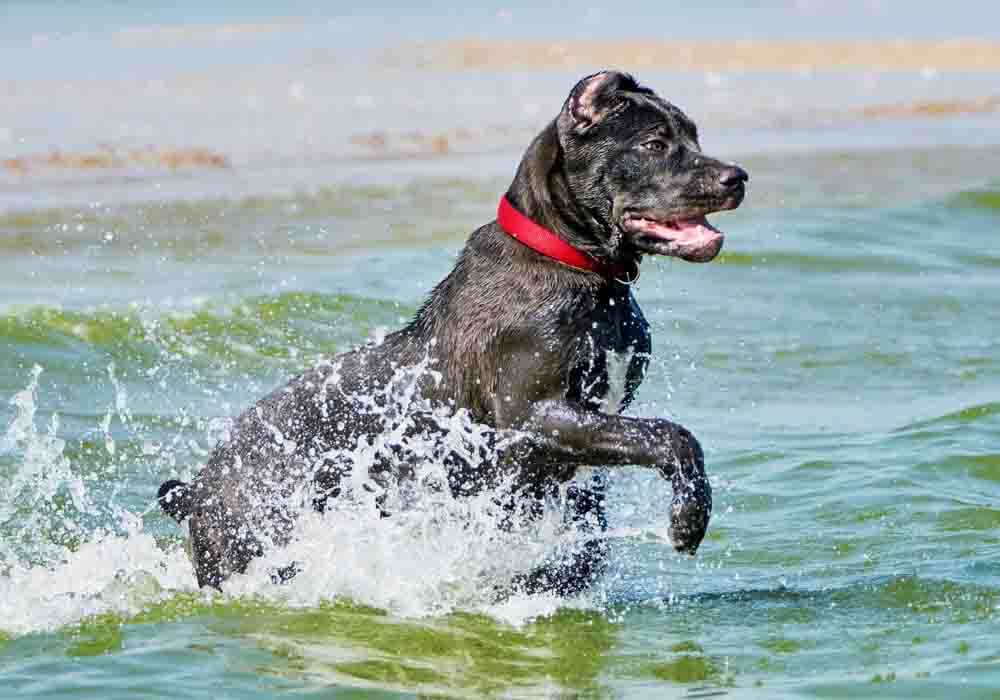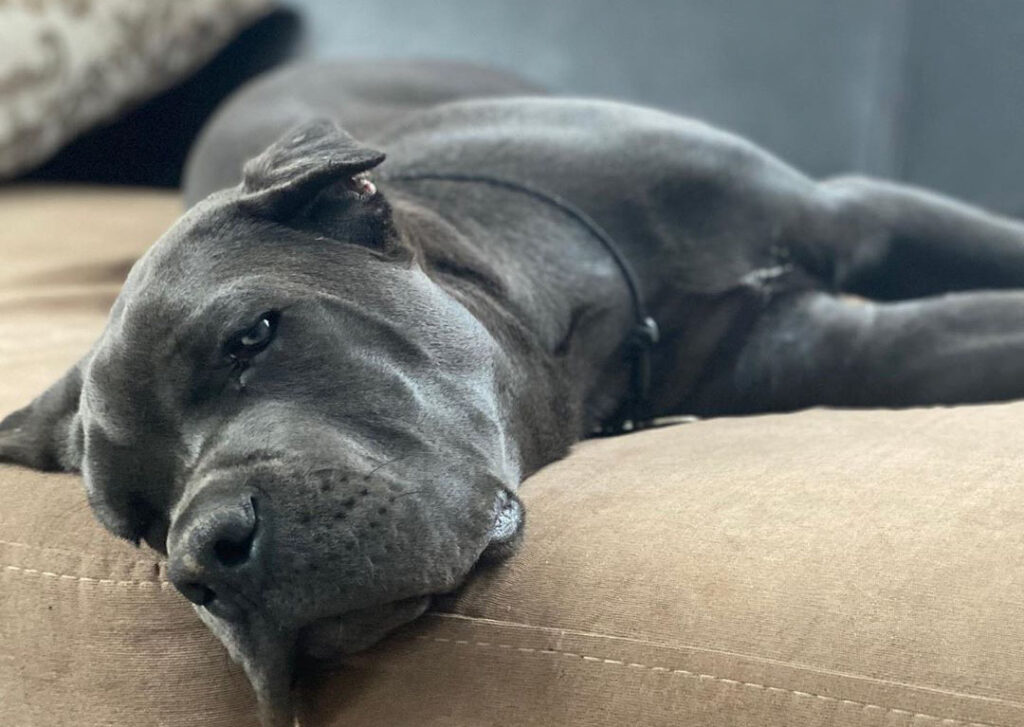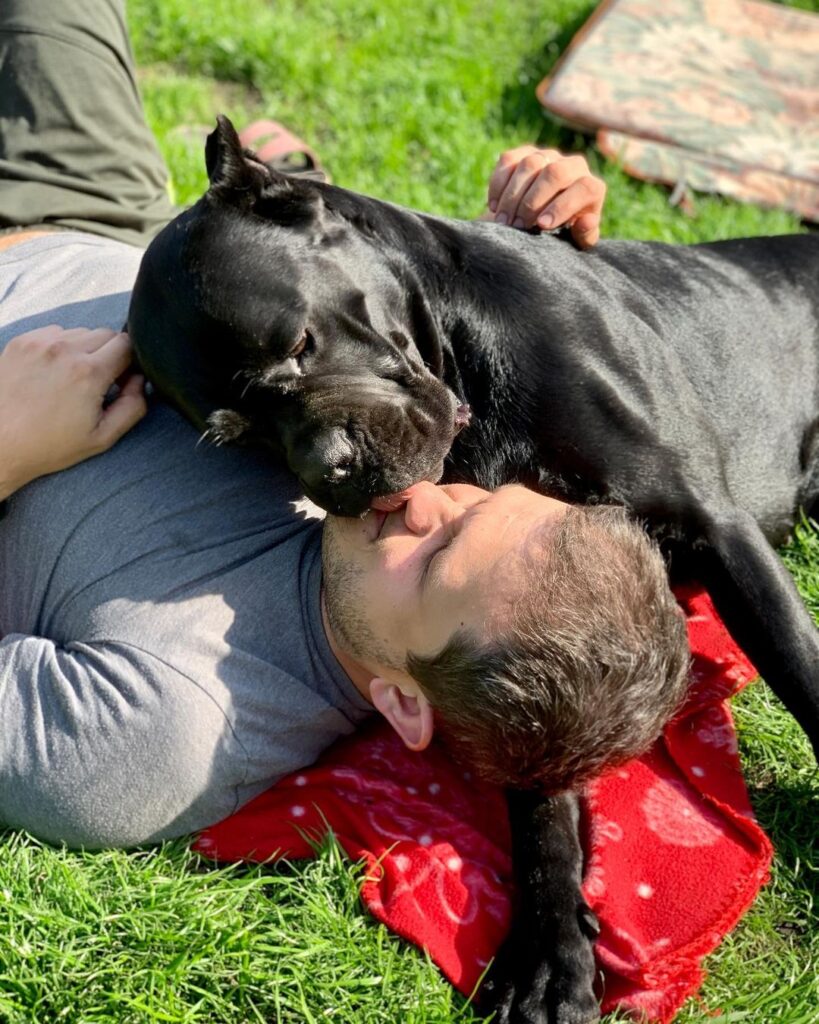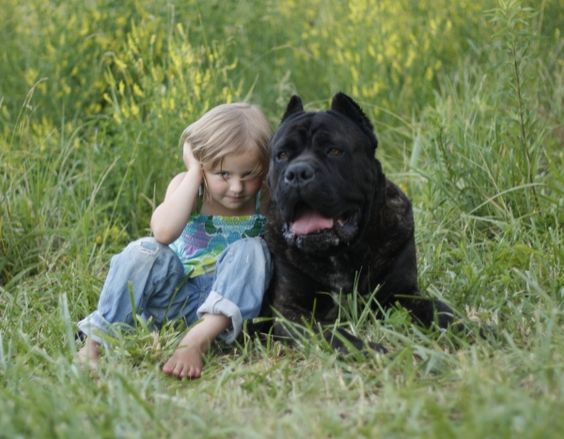
Cane Corsos, often referred to as “Italian Mastiffs,” are powerful and majestic dogs known for their imposing presence. But what about their compatibility with children? This comprehensive guide will delve into the world of Cane Corsos to help you understand their temperament and whether they make child-friendly companions. “Are Cane Corso Good With Kids”
Understanding Cane Corso Temperament
When evaluating a breed’s suitability for families with children, understanding their temperament is crucial. Cane Corsos are renowned for their loyalty, protectiveness, and intelligence. These traits can make them excellent family pets when properly trained and socialized.
Is the Cane Corso a Child-Friendly Breed?
Cane Corsos can indeed be child-friendly, but several factors come into play. It’s important to remember that individual temperament can vary. Early socialization, training, and the dog’s environment play significant roles in determining their behavior around kids.
What is the Typical Temperament of a Cane Corso?
Cane Corsos are often described as gentle giants. They tend to be affectionate and devoted to their families, including children. They’re known for being calm and reserved, making them good candidates for family life.
Do Cane Corsos Have a History of Being Good with Children?
Cane Corsos have a history rooted in working alongside families in Italy. Traditionally, they were used as guard dogs and protectors of the homestead. Their natural instinct to protect makes them watchful over children, and when properly trained, they can be great playmates.
Factors Influencing Cane Corso Behavior Around Kids
Understanding the factors that influence a Cane Corso’s behavior around kids is crucial for a harmonious family environment. While these majestic dogs can be gentle giants, several factors can shape their interactions with children.
How Does Socialization Affect a Cane Corso’s Behavior with Children?
Socialization plays a pivotal role in shaping a Cane Corso’s behavior around kids. Early and positive exposure to various people, including children, helps them develop social skills and learn appropriate behavior. It teaches them to be comfortable and relaxed in the presence of kids.
When a Cane Corso is well-socialized with children, they tend to be more patient, tolerant, and less prone to fear or aggression. They learn to interpret a child’s movements and noises as part of everyday life, reducing the likelihood of anxiety or overreactions.
Are There Any Age-Specific Considerations When It Comes to Cane Corsos and Kids?
Yes, age-specific considerations are essential when integrating a Cane Corso into a family with children. Here are some key points to keep in mind:
Puppies:
- Puppy Socialization: Introducing a Cane Corso puppy to children is ideal. Puppies are more adaptable and learn quickly, making it easier to instill positive behaviors.
- Supervision: Always supervise interactions between a puppy and young children to ensure safety for both.
Adolescence:
- Adolescent Training: During the adolescent phase, Cane Corsos may test boundaries. Consistent training is vital to maintain good behavior around kids.
- Exercise Needs: Adolescents have higher energy levels, so regular exercise is essential to prevent restlessness.
Adult Cane Corsos:
- Steady Companions: Adult Cane Corsos tend to become steady companions for older children who can engage in structured play and activities.
- Ongoing Training: Continue reinforcing positive behaviors and socialization throughout their adult life.
Creating a Safe Environment for Kids Around Cane Corso
Introducing a Cane Corso into your family is an exciting prospect, but it’s essential to prioritize safety, especially when children are involved. In this guide, we’ll explore how to create a secure environment for your kids when living with a Cane Corso.
Supervision and Safety Precautions
What Safety Measures Should I Take When My Cane Corso Is Around Kids?
Supervision: The golden rule is never to leave your Cane Corso and children unsupervised. Even the most well-behaved dogs can have unpredictable moments, and it’s essential to be present to intervene if necessary.
Teach Children: Educate your children about appropriate behavior around the dog. Encourage gentle interactions and let them know when it’s time to give the dog space.
Safe Spaces: Create designated areas where the Cane Corso can retreat to if they need a break from interaction. This allows your dog to have a safe space when they require solitude.
Training: Invest time in training your Cane Corso, teaching commands like “sit,” “stay,” and “leave it.” This training can help manage their behavior around children.
Positive Reinforcement: Reward good behavior with treats and praise. Encourage your Cane Corso to associate positive experiences with your children.
Socialization: Expose your dog to various situations and people, including kids, during socialization. This helps them become accustomed to different scenarios.
Neutering/Spaying: Consider neutering or spaying your Cane Corso. This can reduce the likelihood of certain behaviors that may pose a risk to children.
Can I Leave My Cane Corso Alone with Children?
Leaving your Cane Corso alone with children is generally not recommended, regardless of how well-behaved your dog is. Even the gentlest dogs can react unexpectedly to a child’s sudden movement or behavior. Dogs can become stressed, anxious, or uncomfortable, leading to unintentional reactions.
Always prioritize supervision and follow safety precautions to create a secure environment for your kids and your Cane Corso. Remember that a well-trained and socialized Cane Corso can be a loving and loyal companion for your family, but their interactions with children should always be closely monitored for everyone’s safety and peace of mind.
Training and Socialization: Fostering a Safe Bond Between Your Cane Corso and Children
When it comes to having a Cane Corso in a household with children, training and socialization are key components in ensuring a harmonious and safe environment for everyone involved. In this guide, we will explore how to train your Cane Corso to be comfortable around children and delve into specific socialization techniques.
How Can I Train My Cane Corso to Be Comfortable Around Children?
Begin Early:
Start training your Cane Corso as early as possible, ideally when they are still puppies. Puppies are more receptive to new experiences and behaviors, making training more effective.
Positive Reinforcement:
Use positive reinforcement techniques such as treats, praise, and affection to reward your Cane Corso for good behavior around children. This helps them associate positive experiences with kids.
Basic Commands:
Teach your Cane Corso basic commands like “sit,” “stay,” “leave it,” and “down.” These commands can help you manage their behavior when interacting with children and ensure they respond to your guidance.
Desensitization:
Gradually expose your Cane Corso to various scenarios involving children. This can include controlled encounters with well-behaved children who are familiar with dogs.
Consistency:
Be consistent in your training approach. Set clear boundaries and expectations for your dog’s behavior around children and ensure that everyone in your household follows the same rules.
Are There Any Specific Socialization Techniques for Cane Corsos and Kids?
Controlled Encounters:
Arrange controlled playdates or interactions between your Cane Corso and well-supervised children. Ensure that these encounters are positive and stress-free for both the dog and the children.
Positive Associations:
During socialization, create positive associations for your Cane Corso with children by offering treats, toys, and praise when they exhibit calm and friendly behavior.
Exposure to Different Ages:
Expose your Cane Corso to children of different ages, from infants to teenagers. This helps them become comfortable around kids of all stages of development.
Continuous Socialization:
Socialization is an ongoing process. Continue exposing your Cane Corso to children and different environments throughout their life to maintain their comfort and adaptability.
Observing Your Cane Corso When They Are Around Kids
When introducing your Cane Corso to children, close observation is crucial to ensure a safe and harmonious environment. In this article, we’ll explore how to observe your Cane Corso’s behavior around kids, recognizing positive interactions, and understanding their comfort levels.
Recognizing Positive Interactions
What Are the Signs of a Positive Interaction Between My Cane Corso and Children?
- Relaxed Body Language: A content and comfortable Cane Corso will exhibit relaxed body language. Look for loose, wagging tails, and ears in their natural position.
- Playfulness: Positive interactions often involve playfulness. If your Cane Corso is engaging in gentle play with children, such as chasing a ball or engaging in tug-of-war without aggression, it’s a positive sign.
- Gentle Movements: Your dog should move gently around children, being careful not to knock them over or display overly excited behavior.
- Tail Wagging: While not always an indicator of happiness, a slow, wagging tail is often a sign that your Cane Corso is comfortable and enjoying their time with children.
- Calm and Relaxed Behavior: If your dog is calmly lying down or sitting near children without signs of anxiety, aggression, or fear, it’s a positive interaction.
- Appropriate Responses: When children interact with your Cane Corso, a well-adjusted dog will respond appropriately to their actions, such as tolerating petting or allowing kids to play with their toys.
How Can I Tell if My Cane Corso Is Comfortable Around Kids?
Behavioral Cues:
- Watch for behavioral cues, such as your Cane Corso seeking out interaction with children or approaching them with a relaxed demeanor.
- Observe their facial expressions. A comfortable Cane Corso will have soft eyes, a relaxed mouth, and may even display a slight, contented smile.
- Pay attention to their breathing and overall body posture. Rapid, shallow breathing or tense, stiff body language can indicate discomfort or stress.
Vocalizations:
- Listen to vocalizations. If your Cane Corso is making low, contented sounds, like soft grumbling or sighs, it’s often a sign of comfort.
- On the other hand, growling, barking, or whining may indicate anxiety, fear, or irritation.
Physical Contact:
- Take note of your dog’s willingness to engage in physical contact with children. If they voluntarily approach kids for affection or allow petting without signs of discomfort, it’s a positive sign.
- Conversely, if your Cane Corso actively avoids contact with children or tries to retreat to a safe space, it may indicate they are not entirely comfortable.
Identifying Warning Signs
Ensuring the safety of your children when living with a Cane Corso is paramount. Part of this responsibility includes being able to identify warning signs of potential issues between your dog and your kids. In this article, we’ll explore what red flags to watch out for and how to react if your Cane Corso displays aggressive behavior towards children.
What Are the Red Flags I Should Watch Out for When My Cane Corso Is with Children?
Growling or Snarling: Growling or snarling is a clear sign of discomfort, irritation, or aggression. If your Cane Corso displays these behaviors around children, it’s a warning sign.
Stiff Body Language: A tense and stiff body posture, with ears pinned back and a raised tail, indicates your dog’s unease or potential aggression.
Baring Teeth: If your Cane Corso shows their teeth in a threatening manner, it’s a sign of aggression. This is a crucial warning signal to pay attention to.
Direct Staring: A fixed, direct stare can be a sign of dominance or aggression. It’s important to intervene if your dog engages in prolonged staring at a child.
Lip Curling: Curling of the lips, especially if accompanied by growling or snarling, is a clear indication of aggression.
Snapping or Lunging: Any attempt to snap at or lunge towards a child is a serious red flag and should be addressed immediately.
How Should I React if My Cane Corso Displays Aggressive Behavior Towards Kids?
Stay Calm: Your immediate reaction should be to remain calm. Panicking or raising your voice can escalate the situation.
Separate the Dog: Safely and calmly remove your Cane Corso from the situation. Use a leash or a barrier if necessary.
Give Space: Ensure your child is safe and away from the dog’s reach. Make sure they understand not to approach or engage with the dog during the incident.
Consult a Professional: If your Cane Corso displays aggression towards children, it’s essential to consult a professional dog trainer or behaviorist immediately. They can assess the situation and provide guidance on how to address the behavior.
Reevaluate the Environment: Consider whether there are any environmental factors contributing to the aggression, such as resource guarding or territorial behavior. Address these issues with professional guidance.
Prioritize Safety: Safety should always be the top priority. Never leave your Cane Corso unsupervised with children if there’s a history of aggression.
Training Your Cane Corso to Be Socialized Around Kids
When you bring a Cane Corso into your family, ensuring they are well-socialized around kids is vital for a harmonious and safe environment. In this article, we’ll explore the importance of obedience training and specific commands that can improve your Cane Corso’s behavior around children.
Obedience Training
Obedience training is the foundation for a well-behaved and socialized Cane Corso. It provides a structured framework for your dog to understand their role in the family and how to interact with children and adults.
What Basic Obedience Commands Should I Teach My Cane Corso Regarding Kids?
- Sit: Teaching your Cane Corso to sit on command is fundamental. It allows you to control their actions and prevents impulsive behavior when interacting with kids.
- Stay: The “stay” command is crucial for maintaining a safe distance between your dog and children when needed. It helps prevent your Cane Corso from approaching too closely or abruptly.
- Leave It: “Leave it” is vital for redirecting your dog’s attention away from items that may be dangerous to children or other pets.
- Down: The “down” command is useful for encouraging calm behavior and preventing jumping on kids, which can be intimidating or even harmful.
- Come: “Come” is an essential command for recall. It ensures that your Cane Corso returns to you promptly when called, especially if they become too excited during play.
- No Jump: Teaching your dog not to jump on people is essential, especially when kids are involved. It prevents accidents and keeps interactions safe.
How Can Obedience Training Improve the Cane Corso’s Behavior Around Children?
Obedience training enhances your Cane Corso’s behavior around children in several ways:
Control: Training provides you with control over your dog’s actions, allowing you to manage their behavior around kids effectively.
Predictability: Well-trained dogs are predictable, making it easier to anticipate their reactions in various situations, including interactions with children.
Safety: Obedience commands like “stay” and “leave it” can be crucial in preventing accidents or conflicts between your Cane Corso and kids.
Communication: Training fosters clear communication between you and your dog, helping your Cane Corso understand what is expected of them when interacting with children.
Confidence: Obedience training builds your Cane Corso’s confidence, which can result in more relaxed and controlled behavior around children.
Professional Help: Ensuring a Safe and Happy Relationship Between Your Cane Corso and Kids
Introducing a Cane Corso into a family with children can be a rewarding experience, but it comes with responsibilities, including proper training and behavior management. In some cases, seeking professional help may be necessary. This article will explore when to consider hiring a professional trainer for your Cane Corso’s behavior around kids and whether specialized trainers for Cane Corsos and kids exist.
When Should I Consider Hiring a Professional Trainer for My Cane Corso’s Behavior Around Kids?
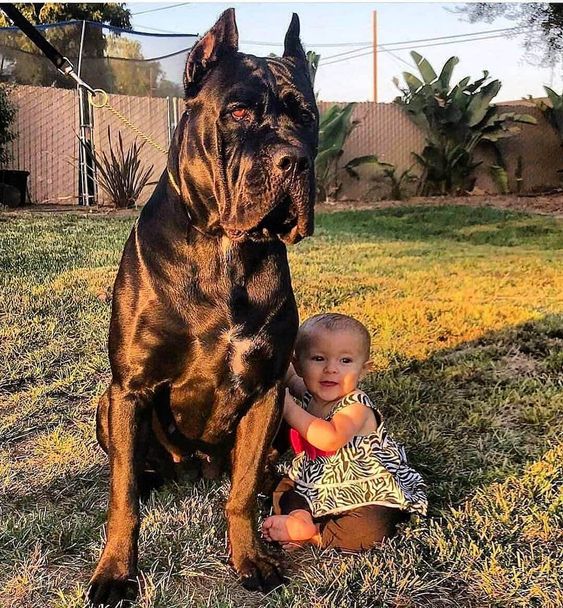
Aggressive Behavior: If your Cane Corso displays signs of aggression towards children, such as growling, snapping, or biting, it’s essential to consult a professional trainer immediately. Safety should be the top priority.
Fear or Anxiety: If your Cane Corso exhibits excessive fear or anxiety around children, it can lead to unpredictable reactions. A professional trainer can help address these issues.
Lack of Socialization: If your Cane Corso has not been adequately socialized with children during puppyhood and displays fear or discomfort, a trainer can assist in gradual socialization.
Resource Guarding: If your dog exhibits resource guarding behavior, such as protecting toys or food from children, a trainer can provide strategies to address this issue safely.
Uncontrollable Excitement: Some Cane Corsos become overly excited when children are present, leading to potentially dangerous situations. A trainer can help you manage their excitement.
Difficulty with Basic Commands: If your dog struggles with basic obedience commands that are essential for managing their behavior around kids, a trainer can provide guidance.
Are There Specialized Trainers for Cane Corsos and Kids?
Yes, some professional dog trainers specialize in working with Cane Corsos and their interactions with children. These trainers typically have experience with the breed’s unique characteristics and understand the importance of proper socialization and training for Cane Corsos in family settings.
Specialized trainers can:
- Assess your Cane Corso’s behavior and tailor training programs to address specific issues related to children.
- Provide guidance on teaching your children how to interact safely with the dog.
- Create a customized training plan that considers the needs of your family and Cane Corso.
When seeking a specialized trainer, it’s essential to research their qualifications and experience, ask for references, and ensure they have a solid understanding of both Cane Corso behavior and child-dog interactions.
FAQs
Can Cane Corsos be good family pets for households with children?
Yes, Cane Corsos can make excellent family pets if properly trained and socialized.
What age is suitable for introducing a Cane Corso to a household with kids?
It’s best to introduce a Cane Corso to a family with kids as a puppy for easier socialization.
Do Cane Corsos have a tendency to be aggressive towards children?
While every dog is an individual, Cane Corsos can be prone to aggression if not properly trained and socialized.
Are Cane Corsos naturally protective of children?
Cane Corsos have a protective instinct, but proper training is needed to ensure it’s channeled appropriately.
What are some signs that my Cane Corso is comfortable around my kids?
Signs of comfort may include relaxed body language and positive interactions, such as playing gently with kids.
How can I socialize my Cane Corso with children effectively?
Gradual exposure, positive reinforcement, and controlled interactions can help socialize your Cane Corso with kids.
Should I leave my Cane Corso unsupervised with children?
It’s not advisable to leave any dog, including a Cane Corso, unsupervised with young children.
Can professional trainers help improve my Cane Corso’s behavior around kids?
Yes, professional trainers can provide guidance and training to improve your Cane Corso’s behavior around children.
Are there any specific commands I should teach my Cane Corso regarding kids?
Basic commands like “sit,” “stay,” and “leave it” can be crucial when managing interactions between your Cane Corso and kids.
What should I do if my Cane Corso shows aggressive behavior towards kids?
If your Cane Corso displays aggression, consult a professional trainer or behaviorist immediately to address the issue safely.
Conclusion
In conclusion, the well-being and safety of your children and your Cane Corso are paramount when integrating this majestic breed into your family. While Cane Corsos can be loving and protective companions, it’s essential to be vigilant and proactive in their training and socialization, especially around kids.
Recognizing both positive interactions and warning signs in your Cane Corso’s behavior is crucial. Timely intervention and proper training can mitigate potential issues and foster a harmonious relationship.
With over 4 years of devoted companionship with my beloved Labrador Retriever, Robin, I have cultivated a deep understanding and expertise in all things canine. From training and behavior to health and well-being.

